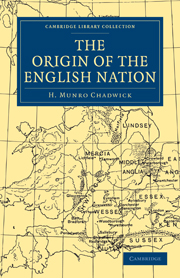Book contents
- Frontmatter
- PREFACE
- Contents
- CHAPTER I ENGLAND IN THE SIXTH CENTURY
- CHAPTER II THE WEST SAXON INVASION
- CHAPTER III THE INVASION OF KENT
- CHAPTER IV THE SAXONS, ANGLES AND JUTES IN BRITAIN
- CHAPTER V THE SAXONS, ANGLES AND JUTES ON THE CONTINENT
- CHAPTER VI THE KINGS OF ANGEL
- NOTE. THE EARLY KINGS OF THE DANES
- CHAPTER VII THE AGE OF NATIONAL MIGRATIONS
- CHAPTER VIII THE SAXONS AND ANGLES IN ROMAN TIMES
- CHAPTER IX THE CLASSIFICATION OF THE ANCIENT GERMANI
- CHAPTER X THE CULT OF NERTHUS
- CHAPTER XI KING AETHELWULF'S MYTHICAL ANCESTORS
- CHAPTER XII SOCIAL CONDITIONS OF THE ROMAN PERIOD
- ADDENDA
- INDEX
- Plate section
CHAPTER IV - THE SAXONS, ANGLES AND JUTES IN BRITAIN
Published online by Cambridge University Press: 07 September 2010
- Frontmatter
- PREFACE
- Contents
- CHAPTER I ENGLAND IN THE SIXTH CENTURY
- CHAPTER II THE WEST SAXON INVASION
- CHAPTER III THE INVASION OF KENT
- CHAPTER IV THE SAXONS, ANGLES AND JUTES IN BRITAIN
- CHAPTER V THE SAXONS, ANGLES AND JUTES ON THE CONTINENT
- CHAPTER VI THE KINGS OF ANGEL
- NOTE. THE EARLY KINGS OF THE DANES
- CHAPTER VII THE AGE OF NATIONAL MIGRATIONS
- CHAPTER VIII THE SAXONS AND ANGLES IN ROMAN TIMES
- CHAPTER IX THE CLASSIFICATION OF THE ANCIENT GERMANI
- CHAPTER X THE CULT OF NERTHUS
- CHAPTER XI KING AETHELWULF'S MYTHICAL ANCESTORS
- CHAPTER XII SOCIAL CONDITIONS OF THE ROMAN PERIOD
- ADDENDA
- INDEX
- Plate section
Summary
The people who invaded Britain in the fifth century are said to have belonged to three distinct nations, the Saxons, the Angles and the Jutes. The primary authority for this classification is a passage in Bede's Ecclesiastical History, 1.15, which, as it has always been regarded as the basis of investigation in English ethnology, deserves to be given here in full. “They had come,” he says, “from three of the bravest nations of Germany, namely, from the Saxons, the Angles and the Jutes. The Cantuarii (i.e. the inhabitants of Kent) are of Jutish origin; and so are the Victuarii, i.e. the tribe which inhabits the Isle of Wight, and also that which is still called Iutarum natio in the territory of the West Saxons, occupying a position just opposite the Isle of Wight. The East Saxons, the South Saxons and the West Saxons came from the Saxons, i.e. from the country which is now called the country of the Old Saxons. Lastly, the East Angles, the Middle Angles, the Mercians and the whole population of Northumbria, i.e. the tribes which live to the north of the river Humber, together with the rest of the Anglian peoples—all these are sprung from the Angli, i.e. from a land which is called Angulus and which is said to have remained uninhabited from that time till the present day. It lies between the territories of the Jutes and those of the Saxons.”
This is the only definite and comprehensive statement regarding the origin of the invaders which has come down to us.
- Type
- Chapter
- Information
- The Origin of the English Nation , pp. 51 - 84Publisher: Cambridge University PressPrint publication year: 2010First published in: 1924

